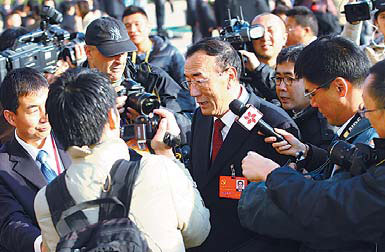Transport boost for Tibet
Updated: 2012-11-09 08:03
By Zhu Zhe (China Daily)
|
||||||||
|
Qiangba Puncog (center), chairman of the Standing Committee of the Tibet People's Congress, speaks with reporters in front of the Great Hall of the People on Thursday in Beijing. Zou Hong / China Daily |
New railway line among measures to improve flow of passengers, goods in region
Southwest China's Tibet autonomous region will speed up construction of its transport network in coming years to boost the flow of passengers and goods, a senior regional official said on Thursday.
Construction of a new railway linking Lhasa, capital of Tibet, and Nyingchi prefecture in the region's southeast will start very soon, Padma Choling, chairman of the autonomous region, told a group discussion at the 18th National Congress of the Communist Party of China in Beijing.
He did not disclose details of the route or budget for the line.
Media reports in April said the 435-km-long Nyingchi-Lhasa Railway is part of the proposed Sichuan-Tibet Railway, linking Chengdu in neighboring Sichuan province and Lhasa.
Upon completion, the journey between Lhasa and Nyingchi, which now are linked by car and airplane, will be shortened to less than two hours from the current more than nine hours' drive.
The Sichuan-Tibet Railway will be 1,900 km long, with investment of about 130 billion yuan ($20.8 billion) in State funds. Construction will take six years, according to the Tibet Daily.
Construction work will be difficult, having to overcome frozen earth, landslides, rock slides, cold weather and lack of oxygen due to high altitude in some places.
On Thursday, a senior Tibetan legislator also said another railway, between Lhasa and Xigaze, will begin operating by the end of 2014.
"Construction of the railway has been progressing well despite some geological difficulties," Qiangba Puncog, chairman of the Standing Committee of the Tibet People's Congress, said on the sidelines of the Party congress.
The line from Lhasa to Xigaze is the first extension of the world's highest-altitude rail link, the Qinghai-Tibet Railway, which opened in July 2006. Work on the extension started in September 2010.
The extension, with a budget of 13.3 billion yuan ($1.98 billion), will run for 253 km, according to the National Development and Reform Commission.
The new section will pass through five counties and over the 90-km-long Yarlung Zangbo Grand Canyon.
Qiangba Puncog said problems with frozen earth - which plagued construction of the Qinghai-Tibet Railway - will not be experienced this time because the extension will not pass through much frozen ground.
The two new lines will boost the flow of passengers and goods, thus bringing in more travelers and products from other parts of China or the world, said Zhou Guangzhi, Party chief of Lhasa's Quxu county. Both lines will pass through the county.
Construction of the two new lines is part of the autonomous region's plan to speed up development of its transport system, Padma Choling said, adding that more roads and airports are being planned.
He said that in the past 10 years, Tibet has achieved great progress in infrastructure construction and in improving people's livelihoods, and the next 10 years will be a crucial period for Tibet's further development.
However, he stressed that stability is also a priority for the region, and said despite some disturbance from the Dalai Lama clique, the overall stability of Tibet is guaranteed.
Hao Peng, deputy Party chief of Tibet, who is also in Beijing to attend the Party congress as a delegate, said on Thursday that stability is the foundation for Tibet's further development, while development is the key to solving all problems in Tibet.
Qiangba Puncog on Thursday also criticized the Dalai Lama's 10-day trip to Japan, which began on Sunday.
"It's not the first time for him to do this, and I think it won't be the last time," he said. "But such separatist activities, under the disguise of religion, won't exert any negative impact on Tibet's stability."
zhuzhe@chinadaily.com.cn
(China Daily 11/09/2012 page8)

 Relief reaches isolated village
Relief reaches isolated village
 Rainfall poses new threats to quake-hit region
Rainfall poses new threats to quake-hit region
 Funerals begin for Boston bombing victims
Funerals begin for Boston bombing victims
 Quake takeaway from China's Air Force
Quake takeaway from China's Air Force
 Obama celebrates young inventors at science fair
Obama celebrates young inventors at science fair
 Earth Day marked around the world
Earth Day marked around the world
 Volunteer team helping students find sense of normalcy
Volunteer team helping students find sense of normalcy
 Ethnic groups quick to join rescue efforts
Ethnic groups quick to join rescue efforts
Most Viewed
Editor's Picks

|

|

|

|

|

|
Today's Top News
Health new priority for quake zone
Xi meets US top military officer
Japan's boats driven out of Diaoyu
China mulls online shopping legislation
Bird flu death toll rises to 22
Putin appoints new ambassador to China
Japanese ships blocked from Diaoyu Islands
Inspired by Guan, more Chinese pick up golf
US Weekly

|

|







